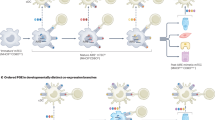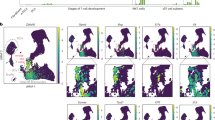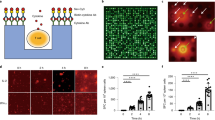Abstract
It is possible to regulate the activity of human influenza virus specific helper T-cell clones either by high concentrations of antigen1 or by anti-idiotypic suppressor T cells2. In the absence of accessory cells, the appropriate peptide antigen recognized by the clones induces specific unresponsiveness. This phenomenon, however, is not the result of cytolysis as respon-siveness to IL-2 remained unaltered. This suggests that high-dose immunological tolerance need not involve suppressor T cells, and that peptide antigens can interact directly with the T-cell surface. As recent reports suggest that the T-cell surface antigen T3 is involved in the triggering of T lymphocytes and possibly in antigen recognition3,4 we have investigated the expression of T3 and other cell surface antigens following the induction of T-cell tolerance. We report here that when a T-cell clone is exposed to a tolerizing concentration of the appropriate peptide antigen, surface T3 antigen is lost in a dose-dependent manner. As loss of surface T3 induced by anti-T3 antibody also results in unresponsiveness to antigen, we conclude that T3 is involved in the process of T-cell triggering by antigen.
This is a preview of subscription content, access via your institution
Access options
Subscribe to this journal
Receive 51 print issues and online access
$199.00 per year
only $3.90 per issue
Buy this article
- Purchase on SpringerLink
- Instant access to full article PDF
Prices may be subject to local taxes which are calculated during checkout
Similar content being viewed by others
References
Lamb, J. R., Skidmore, B. J., Green, N., Chiller, J. M. & Feldmann, M. J. exp. Med. 157, 1434–1447 (1983).
Lamb, J. R. & Feldmann, M. Nature 300, 456–458 (1982).
van Wauve, J. P. V., de May, J. R. & Goossens, J. G. J. Immun. 124, 2708–2711 (1980).
Meuer, S. C. et al. J. exp. Med. 157, 705–719 (1983).
Lamb, J. R., Woody, J. N., Hartzmann, R. J. & Eckels, D. D. J. Immun. 129, 1465–1470 (1982).
Lamb, J. R. et al. (submitted).
Lamb, J. R., Eckels, D. D., Lake, P., Woody, J. N. & Green, N. Nature 300, 66–69 (1982).
Reinherz, E. L. et al. Cell 30, 735–747 (1982).
Kontiainen, S. & Feldmann, M. Thymus 1, 59–68 (1979).
Beverley, P. C. L. & Callard, R. E. Eur. J. Immun. 11, 329–334 (1981).
Engleman, E. G. & Levy, R. Clin. Res. 28, 511–513 (1979).
Beverley, P. C. L. & Callard, R. E. Protides biol. Fluids 29, 653–658 (1981).
Kamoun, M. et al. J. exp. Med. 153, 207–212 (1981).
Haynes, B. H., Eisenbarth, G. S. & Fauci, A. S. Proc. natn. Acad. Sci. U.S.A. 76, 5829–5932 (1979).
Beverley, P. C. L. Transplant clin. Immun. 11, 87–94 (1980).
Trucco, M. M., Stocker, J. W. & Ceppellini, R. Nature 273, 666–668 (1980).
Friedman, S. M. et al. Proc. natn. Acad. Sci. U.S.A. 74, 711–715 (1977).
Lamb, J. R., Lake, P., Johnson, A. H., Hartzman, R. J. & Woody, J. N. J. Immun. 128, 233–238 (1982).
Author information
Authors and Affiliations
Rights and permissions
About this article
Cite this article
Zanders, E., Lamb, J., Feldmann, M. et al. Tolerance of T-cell clones is associated with membrane antigen changes. Nature 303, 625–627 (1983). https://doi.org/10.1038/303625a0
Received:
Accepted:
Issue date:
DOI: https://doi.org/10.1038/303625a0
This article is cited by
-
Development of a novel humanized mouse model for improved evaluation of in vivo anti-cancer effects of anti-PD-1 antibody
Scientific Reports (2021)
-
Altered expression of the TCR signaling related genes CD3 and FcεRIγ in patients with aplastic anemia
Journal of Hematology & Oncology (2012)
-
ZAP70: a master regulator of adaptive immunity
Seminars in Immunopathology (2010)
-
Tumor gene therapy by MVA-mediated expression of T-cell–stimulating antibodies
Cancer Gene Therapy (2002)
-
Patho- and immunobiology of malignant mesothelioma: characterisation of tumour infiltrating leucocytes and cytokine production in a murine model
Cancer Immunology Immunotherapy (1994)



